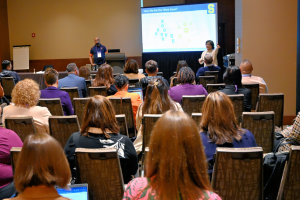
By Heather Zimar, Managing Editor, Journals and Publications, AACRAO, Live from SEM 2024
Dr. Kal Srinivas and Dr. Hope Smalling of Syracuse University (SU) shared with SEM 2024 Conference attendees how they created a “culture of change” on their campus to improve learner success.
In 2015, students began expressing their dissatisfaction with the advising process through surveys, campus conversations, and the university newspaper. The campus realized there was a need for systemic data on academic progress. “Student voices are very important to Syracuse University,” Dr. Srinivas said.
In response, SU began the process of implementing a new advising program, Orange Success. “Our goal was to get better and more information into the hands of advisors than ever before,” Dr. Srinivas said.
The university found many challenges in implementing the program due to the decentralization of the campus. In addition, overcoming resistance to change was key. “It’s your relationships [and] your reliance on trust [which] is important during a change,” Dr. Srinivas said.
SU identified the following ideas as key to a successful change in student services:
Academic Affairs and ITS needed to be strategically aligned
A shift was needed from a department perspective (multiple stakeholders) to a “one university” perspective
Departmental differences had to become less important
Student success is an ethos—a culture—and it’s not something one office can do
The cumulative effect of what we all do helps move the needle on retention
The university gave 300 presentations across the campus during the first year to overcome what the presenters called “the Orange Wall.” The students' passion, dedication, and knowledge came through these presentations. “Slowly and steadily, we broke down the barriers,” Dr. Srinivas said.
The Orange Success program includes the dissemination of “nudges,” or early alerts seeking behavior changes. The system sends “flags” to students where there is a concern, “kudos” to tell those who are doing good work, “referrals” for financial literacy or career services, and “to-dos” for requests like survey completion.
Today, academic advisors, support staff, faculty, and teaching assistants are engaged in Orange Success, and “adoption rates are through the roof,” Dr. Srinivas said, noting that 95.7% of faculty are using the system as of today. “Without faculty, the system is absolutely useless,” she said.
The presenters also worked to get students on board by meeting with student associations and different groups on campus. Dr. Srinivas shared with them that “[t]his is a system that is not going to police you but rather embrace you.”
The campus, Dr. Smalling said, found there were positive outcomes for the nudges among the record number of first-year seminar students this year. For example, more than 77% of the students who received nudges sent for concerns about low participation or a grade at risk ended up passing the course.
Other positive outcomes included:
96% of students surveyed knew their advisor
Students said they received help after they received a nudge
The distribution of nudges among different student population groups was equitable
Faculty and staff responded to alerts and assisted students (and those who didn’t respond faced consequences such as not having a teaching contract renewed), creating a culture of accountability
“We have more and better data around these students now,” Dr. Smalling said, noting the campus also uses predictive analytics to manage the growing amount of information. “There’s not a piece of this system that isn’t integrated across the entire university,” he added.
In closing, Dr. Srinivas said the campus is clearly operating under one university perspective. “Everyone is a ‘retentioneer,’” she said. “It’s now in the DNA of the institution.”